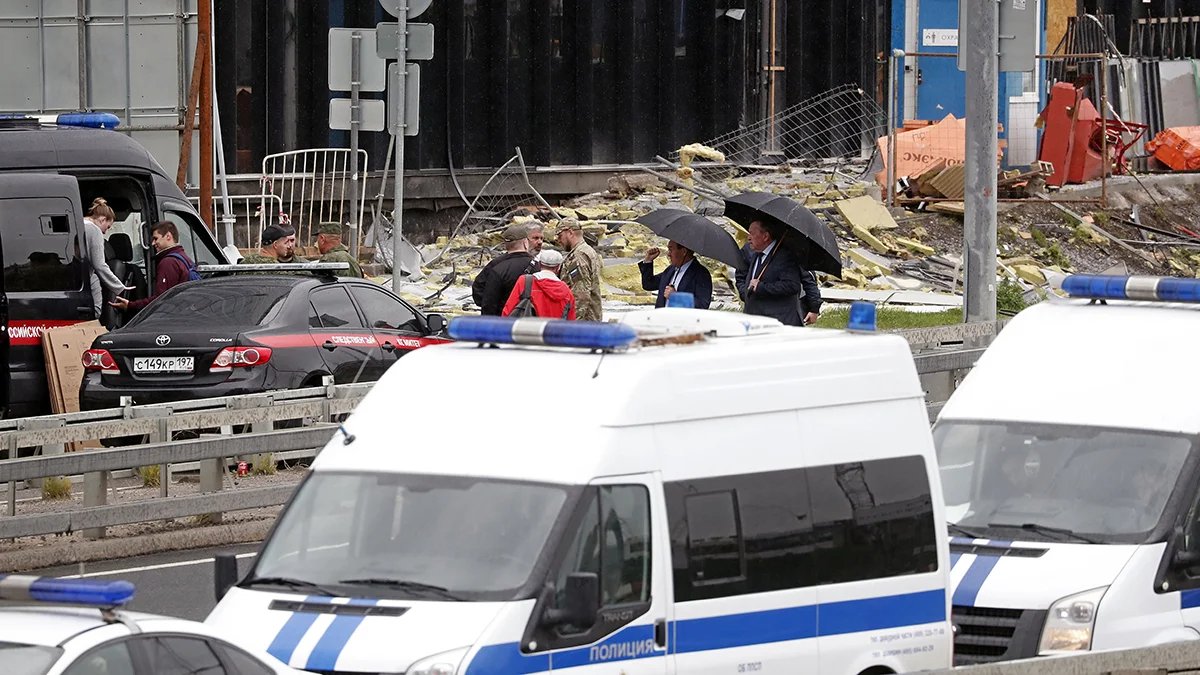
Russian security services outside a damaged building after a drone attack in Moscow in July 2023. Photo: Maxim Shipenkov / EPA-EFE
Just hours before the attack on the Crocus City Hall on Friday, the Russian Federal Security Service (FSB) announced that it had thwarted a “terror attack” not in Russia, but in the occupied Zaporizhzhia region of Ukraine.
The suspect had, according to the FSB, been preparing an explosion in Berdyansk, a city in southeastern Ukraine occupied by Russian forces, on the orders of the Ukrainian intelligence service, and was “neutralised” in an exchange of fire when he apparently resisted arrest.
Since the full-scale invasion of Ukraine began two years ago, the FSB says it has prevented over 100 terrorist attacks, 76 of which they described as “sabotage instigated by the Ukrainian security services”.
The 300 terror attacks the FSB claims to have thwarted in the North Caucasus in the past decade amount to nearly the entire total of FSB anti-terror activities for this period. In 2018, the agency announced that the "complete elimination” of the Russian criminal underground had been achieved.
Since then, the FSB has found new areas of activity. From 2020, it became concerned by the rising number of school shootings sharply, which made up a third of all prevented terror attacks, while since 2022, the FSB’s chief concern has been the search for “Ukrainian neo-Nazis”, which currently account for 73% of prevented attacks.
Another 16 planned attacks uncovered by the FSB since the start of the war were reportedly the work of international terror cells. On 7 March, the FSB said that in Kaluga region the special service liquidated a cell of the organisation “Wilayat Khorasan” — a regional branch of the Islamic State in Afghanistan. Its members were allegedly planning terror attacks on Moscow synagogues.
Two weeks earlier, the FSB organised coordinated raids in 22 Russian regions and detained 49 alleged members of Katiba Tawhid wal-Jihad, an Uzbek-Kyrgyz jihadist militant group based in Syria, who they believe were raising funds for militants in Syria.
The number of criminal cases for terrorist attacks rose sharply in 2023. In the first half of the year alone, 38 cases went before the courts, more than the 2022 total. However, anti-terror legislation in Russia is more often than not used to prosecute anyone critical of the Kremlin, rather than the militants.
For example, on 17 March, a bartender from Voronezh was charged with incitement of terrorism for writing the comments “Death to Putin” and “Kill Putin — save the country” on Russian social media network VK. His earlier comments on pro-Ukrainian Telegram channels, as well as on Instagram and other social networks were also used as evidence of him justifying terrorism.
Over the first year and a half of the war in Ukraine, more than 1,000 cases for inciting, justifying, propagandising and financing terrorism have been brought before Russian courts.
